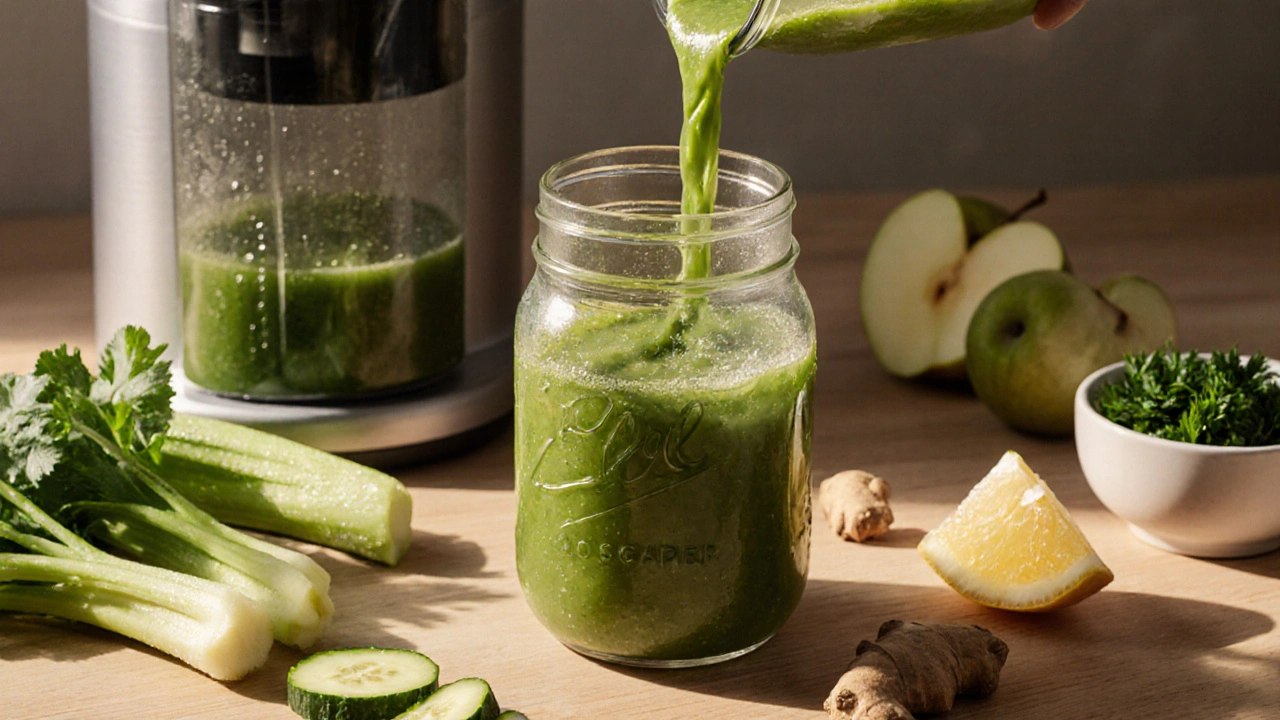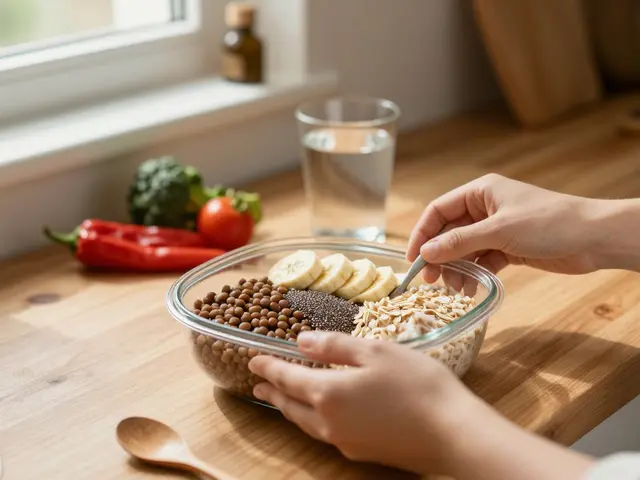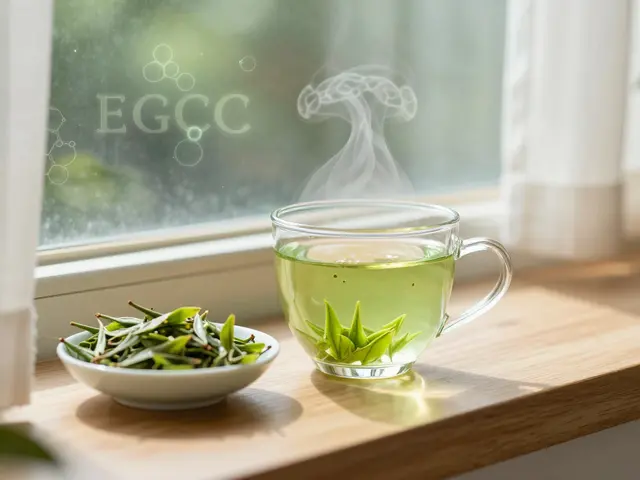Ever feel bloated after eating, even when you’re eating "healthy"? You’re not alone. Millions of people struggle with sluggish digestion, gas, or irregular bowel movements-not because they eat too much, but because their bodies can’t break food down efficiently. One simple, often overlooked fix? Drinking health juices made from whole fruits and vegetables. Not the sugary, pasteurized stuff from the grocery aisle. Real, freshly pressed juices that give your digestive system a gentle reset.
Why Your Digestion Might Be Struggling
Your gut doesn’t just process food-it’s home to trillions of bacteria that influence everything from your immune system to your mood. But modern diets, stress, antibiotics, and processed foods throw that balance off. Fiber is important, sure, but sometimes your gut needs a break from chewing and digesting solid food. That’s where health juices come in.
When you juice, you remove the insoluble fiber, leaving behind the water-soluble nutrients, enzymes, and antioxidants. This means your body doesn’t have to work as hard to absorb them. Think of it like giving your digestive tract a vacation so it can repair and rebalance itself.
How Health Juices Help Digestion
Not all juices are created equal. A glass of orange juice from concentrate won’t do much. But a fresh blend of cucumber, ginger, apple, and lemon? That’s a different story.
- Enzymes kickstart breakdown: Raw fruits and vegetables contain natural enzymes like amylase, lipase, and protease. These help break down carbs, fats, and proteins before your body even starts digesting them. Cooking destroys these enzymes. Juicing preserves them.
- Ginger reduces inflammation: Ginger contains gingerol, a compound proven to speed up gastric emptying and reduce nausea. A 2023 study in the Journal of Neurogastroenterology and Motility found participants who drank ginger juice daily had 30% less bloating after meals.
- Cucumber hydrates and soothes: Cucumber is 96% water and contains silica, which helps repair the gut lining. It’s also naturally alkaline, which can neutralize excess stomach acid.
- Leafy greens detoxify the liver: Kale, spinach, and celery support liver function. Your liver filters toxins from your digestive system. When it’s overloaded, digestion slows. Juicing greens gives it a boost without the fiber burden.
- Apple cider vinegar in juice? Yes, if it’s raw and unfiltered. A teaspoon added to a green juice can increase stomach acid production, which many people lack as they age.
These ingredients don’t just add flavor-they actively support the mechanics of digestion.
What to Juice for Best Results
You don’t need a fancy juicer. A blender with a fine strainer works fine. But if you want maximum enzyme retention, a cold-press juicer is better because it doesn’t heat the ingredients.
Here’s a simple, effective recipe that’s been used by digestive health coaches for years:
- 1 cucumber
- 2 celery stalks
- 1 green apple
- 1-inch piece of fresh ginger
- Half a lemon (peeled)
- Small handful of parsley
Drink this on an empty stomach in the morning. Wait 20-30 minutes before eating. This gives your body a head start on digestion before you introduce solid food.
Another option: beetroot and carrot juice. Beets contain betaine, which helps produce stomach acid. Carrots add beta-carotene and pectin, a soluble fiber that gently binds to toxins and helps remove them. Both are easy on the gut.
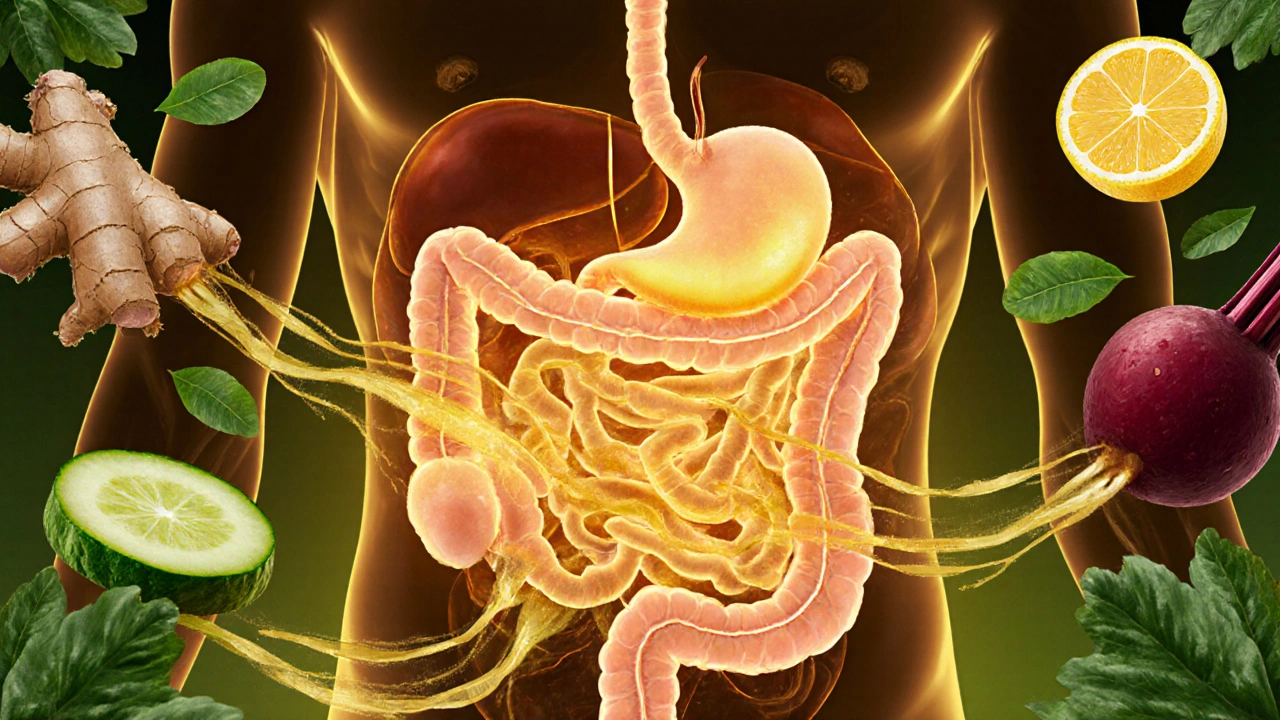
When Health Juices Don’t Help-And When to Stop
Health juices aren’t magic. They won’t fix a chronic condition like IBS, Crohn’s, or SIBO without medical guidance. If you have acid reflux, some citrus or spicy ingredients might make it worse. If you have diabetes, monitor your blood sugar-juices can spike glucose faster than whole fruit.
Also, don’t replace meals with juice long-term. Your body still needs protein and healthy fats to repair tissue and produce digestive enzymes. Juices are a supplement, not a replacement.
Signs you’re overdoing it: diarrhea, cramping, or feeling lightheaded. That means you’re flushing out too much too fast. Dial it back to 2-3 times a week instead of daily.
Real People, Real Results
Take Sarah, 42, from Portland. She had chronic bloating for five years. She tried probiotics, elimination diets, even acupuncture. Nothing stuck. Then she started drinking a daily green juice-just the recipe above. Within two weeks, her bloating dropped by 70%. By month three, she was sleeping better and had more energy. She didn’t change her meals. She just added juice.
Or Mark, 58, who noticed he couldn’t digest meat like he used to. He started adding a small glass of beet-carrot juice before dinner. Within a week, he could eat steak again without discomfort. His doctor was surprised-his liver enzymes had improved.
These aren’t outliers. They’re people who gave their digestive systems the support they were missing.
How to Make Health Juices Sustainable
Buying organic produce helps reduce pesticide load, but it’s not always necessary. Wash everything well. If you’re on a budget, focus on the Dirty Dozen list-apples, celery, spinach, and strawberries are top priorities for organic.
Make juice in batches. Store it in glass jars with minimal air space. It lasts 24-48 hours in the fridge. After that, enzymes start to break down. Don’t leave it out overnight.
Rotate your ingredients. Using the same greens every day can lead to oxalate buildup, which may affect kidney health. Swap kale for chard, spinach for romaine. Add fennel, mint, or dandelion greens for variety.
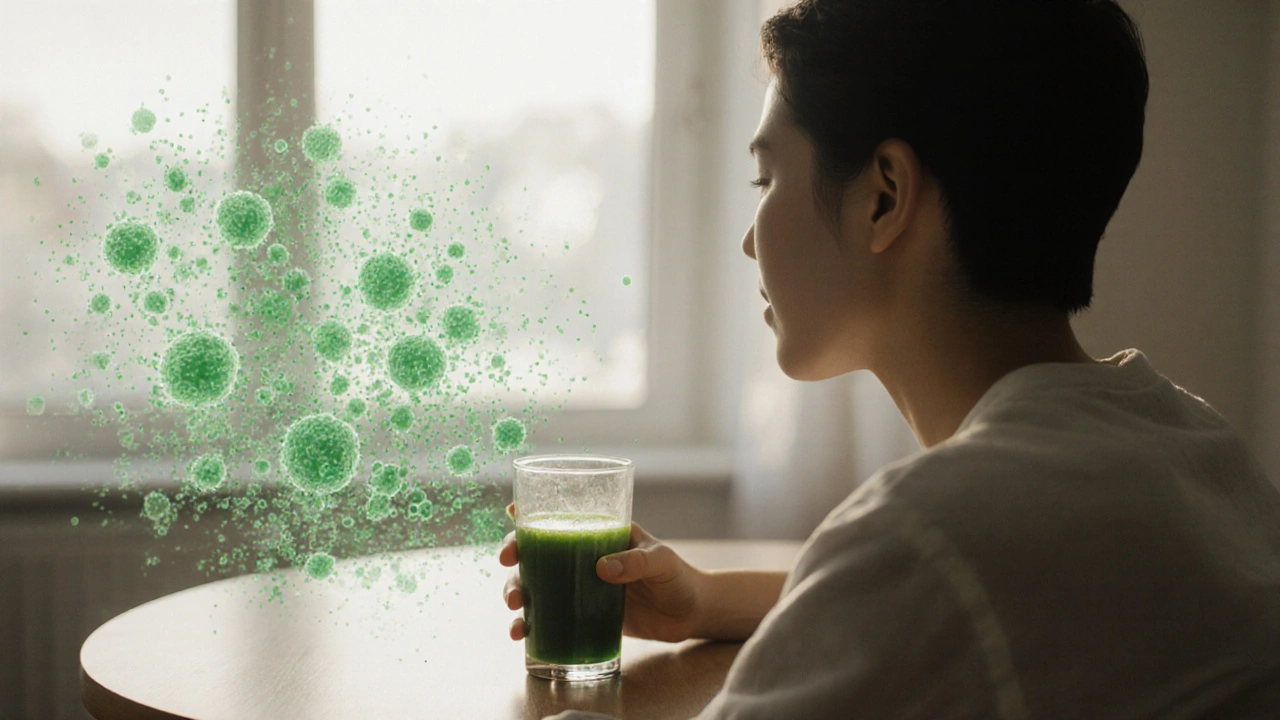
What to Avoid
Stay away from:
- Store-bought juices labeled "100% juice"-most are pasteurized, which kills enzymes
- Juices with added sugar, even "natural" ones like agave or honey
- Smoothies that include milk, yogurt, or protein powder-those are harder to digest and defeat the purpose of a juice cleanse
- Juicing only fruit-too much sugar, not enough fiber or alkalizing minerals
The goal isn’t to feel full. It’s to feel lighter. Clearer. More energized.
How Long Until You Notice a Difference?
Some people feel it within 24 hours-less bloating, clearer skin, better breath. For others, it takes 7-10 days. Consistency matters more than quantity. One small glass a day, five days a week, is better than two large ones on Monday and nothing the rest of the week.
Your gut doesn’t change overnight. But with daily support, it relearns how to work efficiently.
Think of it like watering a plant. You don’t dump a whole bucket once a month. You give it a little, every day.
Can health juices cure digestive disorders like IBS or Crohn’s?
No. Health juices can support digestion and reduce symptoms like bloating and discomfort, but they cannot cure chronic conditions like IBS or Crohn’s disease. These require medical diagnosis and treatment. Juices can be part of a management plan under a doctor’s supervision, but they’re not a substitute for medication or therapy.
Is it better to juice or blend for digestion?
Juicing removes insoluble fiber, making nutrients easier to absorb with less effort from your gut. Blending keeps all the fiber, which is great for regularity but can be harder to digest if your gut is inflamed. If you have sensitive digestion, start with juice. Once you feel better, you can slowly add blended smoothies back in.
Can I drink health juices if I have diabetes?
Yes, but carefully. Fruit-based juices raise blood sugar quickly. Stick to mostly vegetables-cucumber, celery, kale, spinach-with only a small amount of low-glycemic fruit like green apple or lemon. Monitor your levels before and after. Consider adding a teaspoon of apple cider vinegar, which can help blunt sugar spikes.
How often should I drink health juices for digestion?
Start with 3-4 times a week, ideally in the morning on an empty stomach. Once you notice improvements, you can reduce to 2-3 times. Daily use is fine for most healthy people, but listen to your body. If you feel overly light-headed or have loose stools, cut back.
Do I need a special juicer?
Not necessarily. A high-speed blender with a nut milk bag or fine mesh strainer works. But a cold-press juicer extracts more nutrients and keeps enzymes active longer because it doesn’t generate heat. If you’re serious about consistency, it’s a worthwhile investment.
Next Steps: Start Small, Stay Consistent
You don’t need to overhaul your life. Just try one glass of vegetable-based juice in the morning for five days. Notice how you feel-less bloated? More alert? Better bowel movements? That’s your body responding.
Then, slowly add variety. Try fennel for gas. Mint for nausea. Ginger for sluggish digestion. Keep a simple journal. Write down what you drank and how you felt. Patterns will show up.
Digestion isn’t about quick fixes. It’s about daily habits that quietly rebuild your body’s ability to function. Health juices are one of the simplest, most effective tools you can use-if you use them right.
